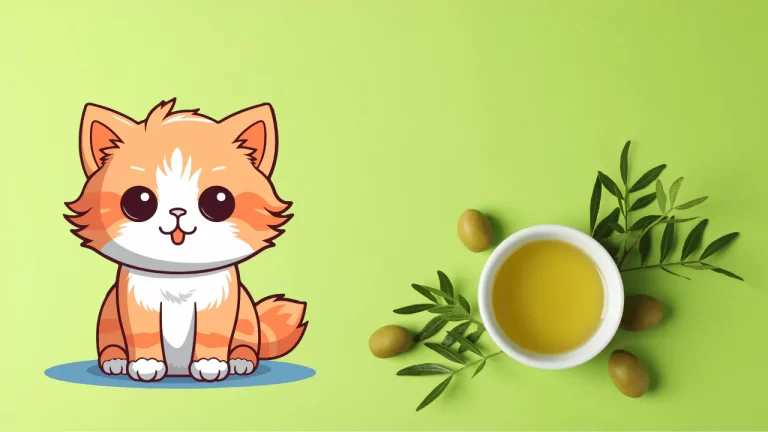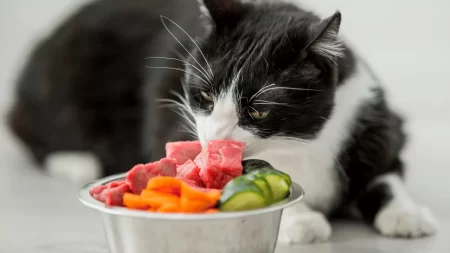If you have ever offered your cat a green olive, you may have noticed that some cats seem to love them, while others show no interest at all. Why is that? And can cats eat olives safely?
Cats may indeed like green olives for various reasons. Green olives contain a chemical compound similar to nepetalactone, found in catnip. This compound can trigger playful or silly behavior in some cats, akin to the effects of catnip.
While not all cats react the same way to the smell or taste of olives, some may enjoy them and even feel euphoric after consuming them.
Generally, olives are considered safe for cats in small quantities and can be given as an occasional treat without causing harm.
Why Are Some Cats Obsessed with Olives?
There are several possible explanations for why some cats are obsessed with olives, while others are indifferent. Here are some of the most common ones:
- Natural attraction to isoprenoids: Isoprenoids are a group of organic compounds that are found in many plants, including olives. Some isoprenoids, such as nepetalactone, are also found in catnip and have a similar effect on cats. They stimulate the olfactory receptors in cats’ noses and trigger a euphoric response. Some cats may be genetically predisposed to react to isoprenoids, while others may not.
- Unique scent and taste: Olives have a strong and distinctive smell and taste that may appeal to some cats’ curiosity and preference. Cats have a keen sense of smell and taste, and they may enjoy exploring new and interesting flavors. Olives are also rich in fat and salt, which may make them more palatable to cats.
- Enjoyment of interaction during treat time: Some cats may associate olives with positive experiences, such as getting attention and affection from their owners or having fun playing with the olive as a toy. Cats are social animals and they may enjoy sharing a treat with their human companions. Olives can also provide mental and physical stimulation for cats, as they can roll, chase, and bat at them.
Can Cats Eat Olives Safely?
Yes, Cats can eat olives safely in small quantities. While olives are not toxic to cats, they should be given sparingly due to their high sodium content. A little nibble of olive occasionally shouldn’t harm your cat, especially if they’ve had them before without any issues. However, too many olives can lead to stomach problems for your feline friend.
It’s worth noting that green olives contain a compound similar to nepetalactone found in catnip, which may make some cats more playful or excited. Despite cats’ occasional interest in olives, they should be considered more as a treat than a regular part of their diet due to their limited nutritional value.
If your cat happens to ingest an olive that falls off the table, there’s typically no cause for concern. However, it’s essential to ensure that olives, especially those seasoned or salted, are not a significant part of your cat’s diet to avoid potential health issues associated with excess sodium and fat intake.
Potential Health Benefits of Olives for Cats
Olives are not a necessary part of a cat’s diet, but they may offer some health benefits for cats, such as:
- Antioxidant properties: Olives are rich in antioxidants, such as vitamin E, polyphenols, and flavonoids, that can help protect the cells from oxidative stress and inflammation. Antioxidants can also support the immune system and prevent infections and diseases.
- Nutritional value: Olives contain some essential nutrients, such as iron, calcium, potassium, and magnesium, that can support the cat’s overall health and well-being. Olives are also a good source of healthy fats, such as oleic acid, that can help lower the cholesterol levels and improve the cardiovascular health.
- Improved digestion: Olives can help improve the digestion and bowel movements of cats, as they contain fiber and probiotics. Fiber can help regulate intestinal transit and prevent constipation and diarrhea. Probiotics can help balance the gut flora and prevent infections and inflammation.
Dangers of Olives for Cats
While olives may have some health benefits for cats, they also pose some dangers, such as:
- Potential for choking hazards: Olives can be a choking hazard for cats, especially if they are whole or have pits. Cats may swallow the olive whole or get the pit stuck in their throat, which can cause suffocation or damage to the esophagus. To prevent this, you should always remove the pit from the olive and cut it into small pieces before giving it to your cat.
- Risk of digestive upset: Olives can cause digestive upset for some cats, especially if they eat too many or are not used to them. Olives are high in fat and salt, which can cause nausea, vomiting, diarrhea, or pancreatitis. Olives may also interfere with the absorption of some medications or supplements that your cat may be taking. To avoid this, you should limit the amount of olives you give to your cat and introduce them gradually to their diet.
- Importance of moderation: Olives should be given to cats as an occasional treat, not as a regular part of their diet. Olives are not a complete and balanced food for cats, and they may lack some essential nutrients, such as protein, taurine, and vitamin A, that cats need. Olives may also add extra calories to your cat’s diet, which can lead to obesity and other health problems. You should consult your veterinarian before giving your cat any new food, and follow their recommendations on the frequency and quantity of olives for your cat.







